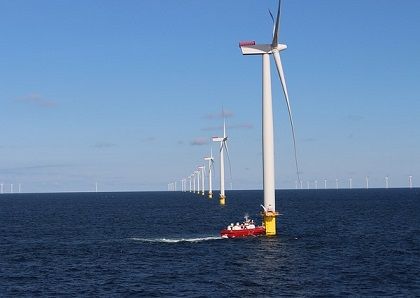It’s a watershed moment for the wind industry. Thanks to the work of researchers from Aarhus University, the Danish manufacturer Vestas will be able to build new turbine blades with epoxy. The company has developed a chemical process which allows it to decompose and be recycled.
“We are super happy to develop possible green solutions for recycling some of the otherwise difficult to recycle plastic types,” chemistry professor in charge of the project Troels Skrydstrup explains.
No need to change production methods
Because the new technique can be adapted to the old generation, all the turbine blades will be fully recycled.
Since the production of epoxy-based wind turbine blades has been standard practice in the wind industry for a few decades, WindEurope expects around 25,000 tonnes of blades to reach the end of their useful life annually from 2025. This is provide the first test for the new process to prove its efficiency.
An alarm system to protect the Arctic regions
With global warming resulting in melting permafrost, Siberia and all the Arctic regions are threatened by some dangerous viruses. In 2016, the bacterium anthrax caused the deaths of 2,300 reindeers and a 12-year-old boy in Siberia. With the help of Canadian colleagues, researchers from SDU are developing an early alarm system to detect when an event like this might reoccur, as permafrost continues to recede in the Arctic regions.
Coffee with milk is good for health
According to some studies made by the University of Copenhagen, drinking coffee with milk can have a beneficial impact on the immune system. A coffee bean is filled with polyphenols – a group of antioxidants known to help reduce ‘oxidative stress’ in the body, which often causes inflammation, while milk is rich in proteins. Combining them can even double the anti-inflammatory properties of immune cells.
Rare Chinese plant can limit rats’ reproduction
Researchers from the University of Copenhagen have found an interesting way to limit rats’ fertility. A substance called Triptolid, which is found on a very rare Chinese plant, has an effect similar to that of birth control pills on the rodent. Nowadays, rat control is carried out with extremely toxic poisons. Who knows if this new discovery might change that.
New virus discovered to kill resistant bacteria
Thanks to a study carried out by SDU, five new species of virus have been discovered and registered in the microbiological inventory. One of them, called Fyn8, has already been fully sequenced and is known to attack and kill the bacterium Pseudomonas Aeruginosa, which has developed resistance to antibiotics and can be found in hospitals. The virus would be extremely helpful for the sterilisation of wounds, for example. According to SDU, when the world could be facing a crisis in which more people die from infections by resistant bacteria than from cancer, the discovery may prove priceless for scientists in the future.
Correlation between traffic noise and tinnitus proved
Everyone who lives next to a busy road has potentially had tinnitus at some point. According to SDU researchers, the phenomenon is due to the noise level, which can affect stress levels and, therefore, people’s sleep. The risk of developing tinnitus increases with stress levels and is affecting a high number of Danes.
A treatment helping newborns with muscular dystrophy recover completely
Newborns with debilitating muscular dystrophy can fully recover if they get early treatment. The disease, known as SMA, is not common: only 7 to 8 Danes suffer from it each year. Already available since 2017, the treatment has now proved its benefits at Rigshospitalet with Rasmus, who’s now thriving according to his mother. The Danish hospital works in collaboration with Aarhus and Odense University Hospitals to help the treatment develop all around the country.
Cigarette butts are the most common plastic pollution in Denmark
To those who smoke: throw your cigarette butts in the bin! In a new study, published in the journal Environmental Science and Technology, cigarette butts discarded in natural areas can have a big impact on the ecosystem. Scientists proved in an experiment that biodiversity was seriously affected, as worms showed were negatively impacted by cigarette butts.
16-year-old hedgehog found in Denmark
Thorvald, a hedgehog living in Denmark, has been crowned the oldest of his species in the world, at the age of 16. According to The Guardian, the previous record was held by an Irish female in 2014, who was seven years younger than the Dane. The male was living near Silkeborg, Central Jutland, and died at Animal Protection Denmark’s wildlife rehabilitation centre.
A Vestas turbine destroyed by fire
A 3MW machine from Vestas was destroyed on Tuesday at the Lem Kær wind park in Western Jutland. The turbine caught fire and is now out of order. The site has been secured and no personnel was injured according to the manufacturer. The company stated their intention to conduct an investigation into the matter.















